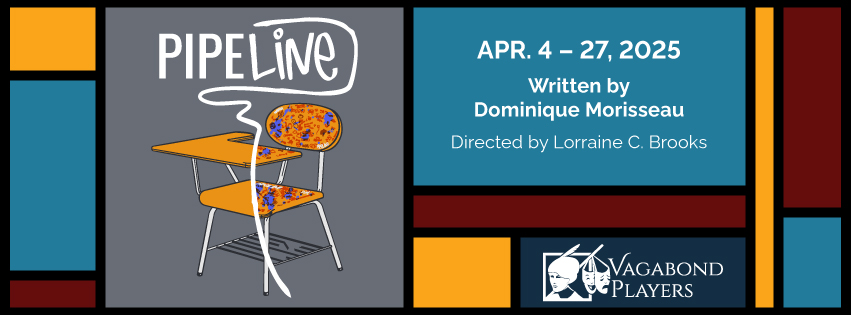People have expectations of you because of how they see you and if you get caught up in how you are seen you become what people expect, be it good, bad, or otherwise. Powerful stuff packed heavily into the words of Dominique Morisseau’s Pipeline appearing as the penultimate production at Vagabond Players in their 109th season. Directed by Lorraine Brooks, this thought-provoking play tackles some tough subject matters and really makes you stop and think about perception, which is highly objective and at the best of times, a very tricky thing.
The scenery for Pipeline is simple; set designer Bruce Kapplin keeps the furnishings space, the décor basic, and the overall aesthetic ordinary. Dominique Morisseau’s narrative is strong enough to stand alone without complex scenery or bulky set pieces, which would ultimately detract from the importance behind the message. And in the absence of scenic extravagance, Kapplin and Director Lorraine Brooks defer to the creative expression of projections on a drop screen that encompasses nearly all of the main wall of the stage. This allows for fluid change of scenery to keep the pacing sharp and as the show run without an intermission, this is a critical component to the overall flow of the action.
What does seem strange is the show’s uneven soundscape. Sound Designer Stephen Deininger has some really impressive sound cues, which are aptly utilized throughout the production to signify location shifts and background sounds. What’s odd is that there are certain scene changes in the beginning of the production that blip to black to show that a transition is occurring) that happen in total silence. But then there are other scenes later in the performance which have music or other sonic features to cover their existence. So whether this was Deininger not programming sound for all of the transitions, Brooks deciding, albeit curiously, that some transitions should have soundscape coverage while others shouldn’t, or booth technician Apryl Bancroft simply missing cues, is unclear, but whatever the case, it made for some questionable moments in stifled darkness that otherwise did not gel with the overall flow of the performance.
Dramatic tension and harsh driving argumentative scenes are the crux of Morisseau’s work in Pipeline. Nearly all of the actors involved in the production (a six-person cast) are delivering heightened sense of emotion, effective expressions of anger, fury, tension, and pathos, and are intensely driving the heavy subject matters featured within the narrative plot. Melissa Scott’s performance, in the focal protagonist role of Nya, is uneven and feels mismatched against the other players on stage. In high-stakes scenes, particularly when the dialogue exchange feels like it should be racing with rage and roaring with energy, Scott maintains the same level tempo and cadence as she does in less-intense moments. This is particularly noticeable in the scene where the Nya character interrogates the Jasmine character and in the scene where the Nya character confronts the Omari character. Where Scott succeeds on stage in this role is in the scene where Dun (Anthony Parker) and Laurie (Melissa Banister) go head-to-head, screaming in each other’s faces. Scott’s Nya acts like a balancing balm, trying to calm both sides of the heated argument before things get out of hand.
Despite the aforementioned unevenness, the rest of the show moves swiftly, building and gathering intensity with every scene. You get a dynamic portrayal of an attitude-laden, ferocious young student from Mae Philippe-Auguste in the role of Jasmine. While the Jasmine character is more of a cameo-support feature, Philippe-Auguste makes the most out of every second she’s on stage. The perpetual state of frustration and anger— either over her situation or her relationship with Omari— is palpable and the way she engages with the Omari character is fierce.
While the character of Xavier is only referenced initially, when Jae West arrives on the scene, you feel as if he’s been a part of the action the whole time. Aloof but composed and fully engaged with the text, West creates a dynamic character out of an otherwise flat cameo. The “who’s bigger/better” showdown between his character and Dun (Anthony Parker) in the emergency room waiting area scene is cheeky but also edgy, feeling as if it could escalate quickly. And West serves as a profound sounding board, though not without his own clap-backs, when the Omari character tries to break down what happened, spouting emotional fireballs at him one rant at a time.
Parker, as school security person Dun, has an intense interaction with Melissa Banister’s Laurie, whose over-the-top bombastic attitude starts at ten, stays at ten, and then gets ratcheted up to eleven in her emotionally cathartic explosion scene late in the performance. Much like Philippe-Auguste’s Jasmine, Banister’s Laurie isn’t written to have much stage time but she makes every moment count. Parker’s Dun has a unique enigmatic balance to him, gentle but firm in some scenes, humorous and heated in others, ready to hold his own in explosive encounters. The in-each-other’s-faces scene between Bannister and Dunn is one of the more aggressively compelling scenes in the performance.
Broadus Nesbitt III delivers a captivating performance as Omari, the character around whom this anecdotal tale of Pipeline revolves. While the character of Nya may be Morisseau’s focal point, Nesbitt III ensures that the audience experiences the story from his perspective, infiltrating his point of view into the overall narrative sublimely. Nesbit III displays a keen sense of spatial awareness, utilizing body language, tone of voice, and spatial expressions to heighten the emotions in any given scene and to drive scenes wherein his character wasn’t necessarily meant to be the driving force. In the apartment encounter between Nya and Omari, Nesbitt III does a superb job of focusing the argument through his character’s perspective and really drives home the situation to the audience.
It’s an intense piece of theatre with strong messages and excellent performances from most of the cast. Pipeline will leave you thinking and questioning your own perspective on the situation of racial tensions in public schools, overcoming one’s neighborhood and circumstance simply because you’re expected to, and reactionary responses that are all too commonplace in our school system today.
Running Time: Approximately 95 minutes with no intermission
Pipeline plays through April 27th 2025 at Vagabond Players— located in the heart of Fells Point: 806 S. Broadway in Baltimore, MD. Tickets can be purchased by calling the box office at (410) 563-9135 in advance online.





